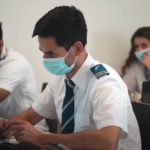After a disastrous year, FINN editor-in-chief Alan Peaford says aerospace already has the people, the skills – and the belief – to rebuild
As 2020 draws to its painful conclusion, it seems incredible looking back, that nobody was talking about the coronavirus as we began our transition in 2020. There were of course some passing references to the odd flu that had led to some domestic flight cancellations in China.
Twelve months on and we look back on a the broken, damaged trail of destruction that saw COVID-19 wreak havoc on the industry – and the world.
In March, as we began to realise this was not a Chinese problem, but in fact the start of a global pandemic. We saw airlines become grounded, airports close, repatriation flights only staffed by crew looking like they were out of a crime scene investigation.
IATA was quick to stand up and call on governments to provide financial support to the grounded aviation industry that stimulates economies and connects people around the world.
By September, that message was sounding tired and evermore desperate, with the only change to the script being the number of billions that were lost, the threat to a recovery and the hope things would rebound soon.
Sustainability: now a key industry focus
When I wrote at the end of last year that our focus needed to be on sustainability and getting the situation with the Boeing 737 MAX resolved, I didn’t think for a moment that would still be a key action point a year later.
Our critics on the sustainability issue – and there are many, despite evidence to the contrary – rejoiced at the reduced aircraft in the skies, and pointed to the cleaner air as being a real benefit and proof of aviation’s “shame”. Of course millions of people working at home, business closing or suspending manufacturing were also making a significant impact on the reducing emissions.
Cargo – a vital lifeline
But at a time when the world suddenly discovered insufficient personal protection equipment (PPE) to support the efforts of frontline health workers, aviation came into its own ferrying billions of tonnes of the valuable plastic around the world. Meantime almost every available freighter was in demand for fresh produce and medical supplies.
Aviation became seen as a lifesaver and vital – even to the most outspoken environmentalist.
A shortage of freighters led to sudden applications to convert grounded passenger aircraft to freighters using cabins to take parcels above the usual belly space for normal containers.
Some 40 per cent of the world’s cargo is carried every day on passenger aircraft hence the sudden drop in capacity.
This was a lifeline for some carriers and as we look towards 2021 then many airlines are already talking about the cargo strategy – especially now there are different vaccines to counter the coronavirus being developed, approved and required right around the world – and quickly.
While, it might have been thought that the COVID crisis might have meant the issue of emissions going to the back burner, it didn’t. Throughout lockdown sustainability matched survivability among the aviation and defence businesses. We saw eco-demonstrator aircraft showing new systems to reduce noise, fuel and emissions; we heard air traffic management organisations talking changes to decades old routing procedures and direct approaches; we saw governments unblocking previously restricted airspace; we introduced new zero emission aircraft – including supersonic – and we noted positive steps towards the introduction of hydrogen fuelled aircraft; as well as regional and urban advanced air mobility.
737 MAX set to return to the skies
Even in the near-term success potential, the 737 MAX appeared to have cleared the hurdles to return to service – boosted by a major order from Ireland’s Ryanair. The aircraft reduces costs for airlines and reduces emissions too.
But the COVID-19 that changed the focus of passenger attention is still very firmly with us. As we close the doors on 2020, we know there are aircraft ready to fly. Tens of thousands of pilots unemployed awaiting a call back from their surviving airlines to get back on the flightdeck. There are MRO providers with aircraft stored on every available bit of grass on airfields around the world ready to grease the parts to get them flying again.
New procedures will make air travel safer
Airports that have developed systems to safely allow contactless progress through their borders and onto the aircraft are ready to show off their new procedures to safely keep distance and remain COVID safe. All that is needed is passengers – and common government processes to allow entry and exit to travel again.
It is without question that the world is a better, happier and wealthier place once travel steps up. But we as an industry also need to work to lobby government but mostly to reassure – with evidence – that our industry will return as the safest means of transport; as an industry to committed to and already implementing environmental and sustainable practices and technology above and beyond the international agreements.
Measures for other polluting industries need beefing up
We need to encourage to Flight Shamers to perhaps turn attention to beefburgers and the the flatulence of cattle which is arguably double the impact of aviation today with no plans to improve in the next decade.
We need passengers to feel pride in their airline; They must be confident that the HEPA filters provide cabin air as safe as any operating theatre; happy that their cellphones contain the vital data for health and identification.
New year, new ways of travel
We need to roar out our confidence and belief that our industry is fit-for-purpose for the new year and perhaps the new ways of travelling in the future.
We will be delivering the precious vaccines – but we know that will be harder than expected, especially in regions like Africa and Asia where infrastructure may not yet be ready.
But when we look ahead, those issues from last year on developing unmanned, urban air mobility and a more sustainable military than we should be confident that we have the people, we have the skills and we have the belief to bring industry back – now let’s shout that to the world get flying again.

